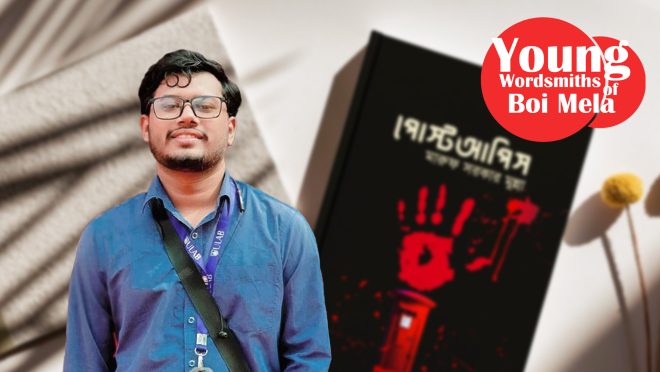'Postapis' Resurrects the Language and Setting of Classic Bangla Short Stories
Young Wordsmiths of Boi Mela
Related News
'Postapis' Resurrects the Language and Setting of Classic Bangla Short Stories

Young Wordsmiths of Boi Mela, a TBS Graduates exclusive series, follows the journey of some of the young authors of Boi Mela. This time we explore ‘Postapis’, a story penned in Sadhu language.
What Rabindranath Tagore once remarked about short stories remains as relevant today as it was in his time. The ability to evoke a sense of “it’s over yet it’s not” is what propels many writers towards crafting short stories. For the young wordsmith Maruf Sarker Munna, this sentiment rings particularly true. In this chapter of “Young Wordsmiths of Boi Mela”, TBS Graduates sat with him for an exclusive interview regarding his short story book titled ‘Postapis’.
‘Postapis’ unfolds within the confines of a quaint post office, delving into the tribulations, mysteries, and the profound loss of the postmaster Rudro, all reflected through the lens of the spirited teenager, Porinita. Set in a village steeped in social superstitions and rampant illiteracy, the narrative exposes how blind faith leads its inhabitants down the path of destitution, exacerbated by the cruel tyranny of Dhorenshyam, leaving them with little choice but to succumb to their fate. Even Porinita, despite her seemingly idyllic life, finds herself losing her rhythm along the way.
Maruf, a student at ULAB, first harboured aspirations of becoming an author back in grade 5, captivated by the verses of poetry books. “There was a time when I would lose myself in these books, forsaking my textbooks entirely. It isolated me from making real-life connections, but literature became the very essence of my being,” he reminisces. As he grew older, he began sharing his writings on social media platforms, receiving accolades that nurtured a loyal readership. Yet, the fear of plagiarism loomed large. Instances of renowned figures appropriating his work left him feeling voiceless against their formidable fan bases. It was then that he resolved to channel his efforts into publishing a book, a decision underscored by his choice to pen ‘Postapis’ in the refined language of Sadhu-bhasha, despite reservations about its reception.
According to Maruf, aspiring student writers ought to embrace experimentation with writing styles and cultivate a passion for travelling, drawing inspiration from literary giants like Rabindranath Tagore and Sharat Chandra Chattopadhyay. He emphasises the invaluable role of extensive reading in honing one’s creative faculties, insisting that every endeavour bears fruit in due time.
Reflecting on the challenges faced during the publication process as a young, fledgling author, Maruf highlights the pervasive struggles encountered by budding writers at Boimela. Publishers often demand exorbitant sums for publication, only to neglect their authors once the transaction is complete. Maruf himself grappled with issues ranging from cover illustrations to formatting, binding quality, and, crucially, proofreading. Given the unconventional nature of his linguistic approach, he underscores the need for meticulous proofreading support, lamenting the tendency to blame authors rather than publishers for oversights.
Despite these hurdles, Maruf is buoyed by the positive reception thus far. He frequents the stall at Noboshahitto Prokashoni (Stall No. 384) of the Amor Ekushey Boi Mela, signing autographs and engaging with readers. Already having built camaraderie with the stallkeepers, he savours each step of his journey with ‘Postapis’. As he relishes this one-of-a-kind journey, we move on to another author of short stories – Pradipta, and his compilation book “Amake ekti gobhir raater golpo likhte dewa hoyechilo” – in the next chapter of “Young Wordsmiths of Boi Mela”.


